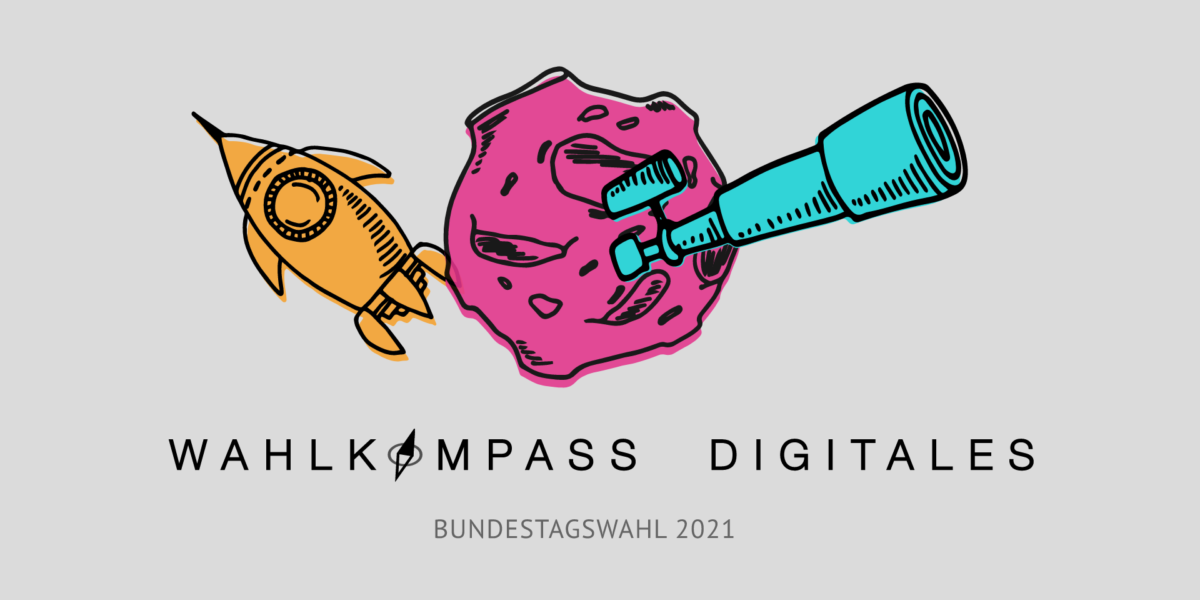
Digital Electoral Compass 2021
Platforms, crypto & AI: Digitisation is a central topic in the 2021 federal election. But what answers do six political parties have to the social discourse on digital regulation, justice and interconnection? Experts and researchers at HIIG have examined their election programmes for statements on digital policy topics.
The Digital Electoral Compass is intended to create transparency, show the parties’ positions on digital policy issues and provide an overview of their individual plans. The election programmes are divided into six thematic categories: Work & Economy, Infrastructure, Social Affairs & Health, Media & Internet, Education & Research, Administration & Openness and Security.
With the help of additional keywords, the application visually illustrates which initiatives the parties represent in these areas and where they differ: How will attacks in cyberspace be dealt with? How will deliverers and online trade be regulated? How digital products will be taxed, how data protection will be ensured and how digital sovereignty will be established?
The aim of the Digital Electoral Compass is to show interested voters, journalists and independent experts the planned steps of the parties in the field of digital policy. It is intended to highlight content in the digital field, but explicitly not to make any election recommendations, bring about decisions or actively intervene in the election campaign. The project was developed in cooperation with the Leibnitz Institute for Media Research | Hans Bredow Institute, which examines the German federal elections from the perspective of platform governance.
| Duration | 07/2021 – 09/2021 |
| Sponsors | The Digital Electoral Compass is a project of the Alexander von Humboldt Institute for Internet and Society and is produced in cooperation with the Leibnitz Institute for Media Research | Hans Bredow Institute as well as the Digital Business University of Applied Science. |
 Fabian Stephany, Dr.Associated Researcher: Innovation, Entrepreneurship & Society
Fabian Stephany, Dr.Associated Researcher: Innovation, Entrepreneurship & Society Jörg Pohle, Dr.Head of Research Program: Actors, Data and Infrastructures
Jörg Pohle, Dr.Head of Research Program: Actors, Data and Infrastructures Larissa WunderlichVisual Communication and Design
Larissa WunderlichVisual Communication and Design
-
 Johanna KlixFormer student assistant: Knowledge & Society
Johanna KlixFormer student assistant: Knowledge & Society -
 Katrin WernerFormer Coordinator for Science Communication and Fundraising
Katrin WernerFormer Coordinator for Science Communication and Fundraising -
 Laura LiebigFormer associated Researcher: The evolving digital society
Laura LiebigFormer associated Researcher: The evolving digital society -
 Licinia GüttelFormer associated Researcher: The Evolving Digital Society
Licinia GüttelFormer associated Researcher: The Evolving Digital Society -
 Marie BlümlFormer Researcher: Sustainability, Entrepreneurship and Global Digital Transformation
Marie BlümlFormer Researcher: Sustainability, Entrepreneurship and Global Digital Transformation -
 Tina KrellFormer Associated Researcher: Innovation, Entrepreneurship & Society
Tina KrellFormer Associated Researcher: Innovation, Entrepreneurship & Society -
 Vincent HofmannFormer Researcher: AI & Society Lab
Vincent HofmannFormer Researcher: AI & Society Lab
Other publications
Timm, M., Sokolovska, N., Kuper, F., Mosene, K. (2021). Fehlende Digitalpolitik bei den Triellen der Kanzlerkandidat:innen – Eine Emanzipation der Wähler:innenschaft. Digital society blog. Publication details
